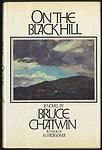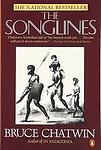Bruce Chatwin
Bruce Chatwin was an English travel writer, novelist, and journalist. He is best known for his book 'In Patagonia' (1977), which established him as a leading travel writer. Chatwin's other notable works include 'The Viceroy of Ouidah' (1980), 'The Songlines' (1987), and 'Utz' (1988). His writing is characterized by a deep curiosity about the world and the people he encountered, blending fiction and non-fiction, and a lyrical prose style. Chatwin's work remains influential in the travel literature genre.
Books
This list of books are ONLY the books that have been ranked on the lists that are aggregated on this site. This is not a comprehensive list of all books by this author.
-
1. On the Black Hill
"On the Black Hill" is a novel that explores the lives of twin brothers, Lewis and Benjamin, who live on a farm on the English-Welsh border. The book spans 80 years of their lives, from the late 19th century to the 1960s, and examines the changes that occur in their rural world during this time. Despite the outside world's transformation, the brothers' lives remain largely unchanged, demonstrating the enduring nature of their close relationship and their connection to the land.
-
2. The Songlines
The book is a semi-fictional account of the author's journey through the Australian Outback, where he explores the culture of the Aboriginal people, particularly their concept of 'Songlines' - invisible pathways that crisscross Australia, ancient tracks connecting communities and following the journeys of ancestral spirits. As he travels, he delves into the nomadic way of life, the idea of walking as a spiritual practice, and the deep connection between the Aboriginal people and the land. The narrative is interspersed with philosophical discussions on topics like nomadism, anthropology, history, travel, and the nature of human restlessness.
-
3. In Patagonia
In this travelogue, the author embarks on a journey through the remote and enigmatic region of Patagonia, located at the southern tip of South America. Blending history, legend, and personal anecdotes, the narrative weaves through the diverse landscapes and cultures of the area, as the author encounters a cast of intriguing characters, from outlaws to settlers, all while searching for traces of its storied past. The book is as much an exploration of the author's wanderlust and love for adventure as it is a portrait of the rugged, windswept terrain and the resilient spirit of the Patagonian people.


